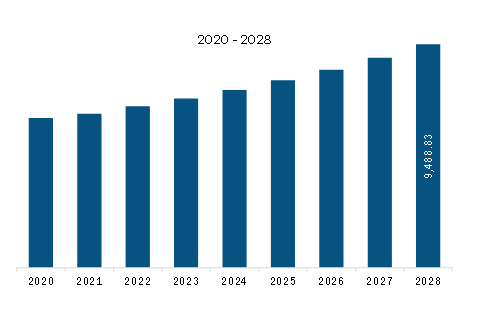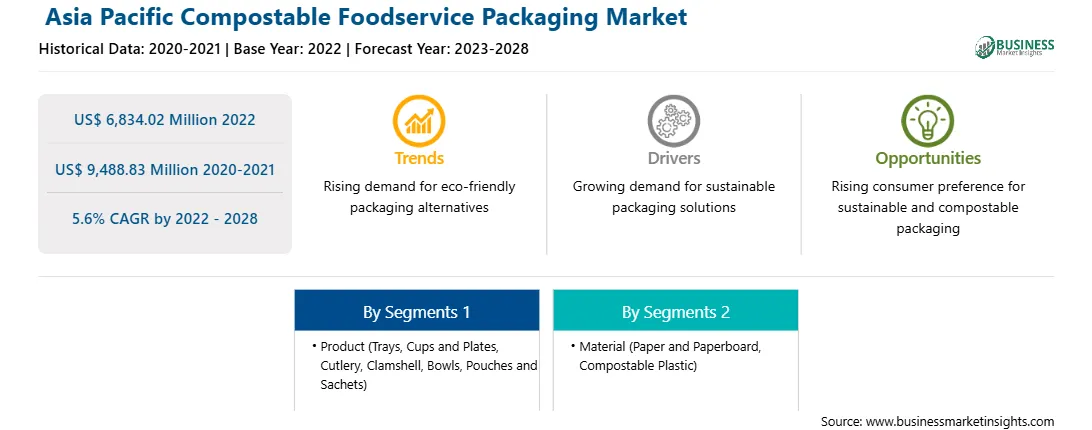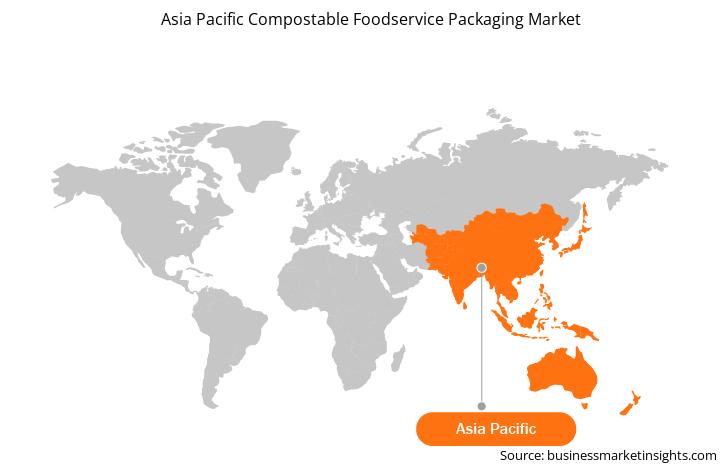The Asia Pacific compostable foodservice packaging market is expected to grow from US$ 6,834.02 million in 2022 to US$ 9,488.83 million by 2028. It is estimated to grow at a CAGR of 5.6% from 2022 to 2028.
Rising Consumer Demand for Pre-Packed Food will be Drive Asia Pacific Compostable Foodservice Packaging Market
The trend towards foodservice packaging and pre-packed food has increased plastic production. Hence, a massive number of retailers and foodservice industries are concentrating on environmentally compatible packaging. Consumer preference for ready-to-eat food and takeaway is rising due to changing lifestyles, increasing disposable incomes, and rapid urbanization, mainly in emerging economies. More consumer trends are also guided by the desire for more portion, personal choices, variety, and shelf life. Nevertheless, according to a study by the United States Department of Agriculture, owing to the time limitations, due to employment shift, consumer demand from grocery stores to pre-packed food or ready-to-eat food has been growing at a fast pace. This, in turn, creates a need for pre-packed food. Further, corporate work culture leading to home food habits is also augmenting the demand for compostable foodservice packaging. Considering consumers' changing lifestyles, many retailers and foodservice industries have revolved around the need for compostable foodservice packaging solutions. Thus, pre-packed food is dominantly fueled by factors, such as demand for nutritious food with low calories and the innovative advancements in packaging technology. Hence, the rising demand for pre-packed food is boosting the compostable foodservice market in the forecast period.
Asia Pacific Compostable Foodservice Packaging Market Overview
The Asia Pacific compostable foodservice packaging market in Asia Pacific is further segmented into Australia, China, India, Japan, South Korea, and the rest of Asia Pacific. The Asia Pacific compostable foodservice packaging market is experiencing robust growth and can grow significantly in a few years. The factors mainly attributed to the growing market include an increase in the number of food service establishments, attractive architecture, delicious new cuisines offerings, along with the sustainable, and attractive packaging solutions offered by the foodservice industry. Compostable foodservice packaging such as trays, cups & plates, cutlery, clamshells, bowls, and pouches & sachets find wide application in cafes, and restaurants due to its compostability, and sustainability, which is projected to boost the market forward during the forecast period.
Many governments in the region taking initiatives in terms of advancements and developments in the packaging industry. Australians use one million kilo tons of single-use plastics annually, 12% of which is recycled. In addition, single-use plastics account for 75% of the plastic encountered along Australia’s coastlines. Hence, on March 21, 2022, The Government of Australia announced a US$ 44.4 million funding stream to help process ‘problematic’ plastic crisp packets and bread bags by developing ‘advanced’ plastic recycling technology. It will also help Australia meet its target to make 70% of its plastic packaging recyclable or compostable and increase the average amount of recycled content in its packaging by 50% by 2025. The country aims to have 70% of its plastic packaging be recyclable or compostable by 2025. Thus, the government's endorsement to develop the packaging industry is considered the primary factor for expanding the Asia Pacific compostable foodservice packaging market within the forecast period.
Asia Pacific compostable foodservice packaging market Revenue and Forecast to 2028 (US$ Million)
Strategic insights for the Asia Pacific Compostable Foodservice Packaging provides data-driven analysis of the industry landscape, including current trends, key players, and regional nuances. These insights offer actionable recommendations, enabling readers to differentiate themselves from competitors by identifying untapped segments or developing unique value propositions. Leveraging data analytics, these insights help industry players anticipate the market shifts, whether investors, manufacturers, or other stakeholders. A future-oriented perspective is essential, helping stakeholders anticipate market shifts and position themselves for long-term success in this dynamic region. Ultimately, effective strategic insights empower readers to make informed decisions that drive profitability and achieve their business objectives within the market. The geographic scope of the Asia Pacific Compostable Foodservice Packaging refers to the specific areas in which a business operates and competes. Understanding local distinctions, such as diverse consumer preferences (e.g., demand for specific plug types or battery backup durations), varying economic conditions, and regulatory environments, is crucial for tailoring strategies to specific markets. Businesses can expand their reach by identifying underserved areas or adapting their offerings to meet local demands. A clear market focus allows for more effective resource allocation, targeted marketing campaigns, and better positioning against local competitors, ultimately driving growth in those targeted areas.
Asia Pacific Compostable Foodservice Packaging Strategic Insights

Asia Pacific Compostable Foodservice Packaging Report Scope
Report Attribute
Details
Market size in 2022
US$ 6,834.02 Million
Market Size by 2028
US$ 9,488.83 Million
Global CAGR (2022 - 2028)
5.6%
Historical Data
2020-2021
Forecast period
2023-2028
Segments Covered
By Product
By Material
Regions and Countries Covered
Asia-Pacific
Market leaders and key company profiles
Asia Pacific Compostable Foodservice Packaging Regional Insights

Asia Pacific compostable foodservice packaging market Segmentation
The Asia Pacific compostable foodservice packaging market is segmented into product material, and country.
Based on product, the Asia Pacific compostable foodservice packaging market is segmented into trays, cups and plates, cutlery, clamshell, bowls, pouches and sachets, and others. In 2022, the cups and plates segment registered a largest share in the Asia Pacific compostable foodservice packaging market.
Based on material, the Asia Pacific compostable foodservice packaging market is segmented into paper and paperboard, compostable plastic {bio-plastic}, and others. In 2022, the compostable plastic segment registered a largest share in the Asia Pacific compostable foodservice packaging market.
Based on country, the Asia Pacific compostable foodservice packaging market is segmented into Australia, China, India, Japan, South Korea, and the Rest of Asia Pacific. In 2022, China segment registered a largest share in the Asia Pacific compostable foodservice packaging market.
Anchor Packaging Pty Ltd; BioBag Americas Inc; Graphic Packaging Holding Co; and WestRock Co are the leading companies operating in the Asia Pacific compostable foodservice packaging market.
The Asia Pacific Compostable Foodservice Packaging Market is valued at US$ 6,834.02 Million in 2022, it is projected to reach US$ 9,488.83 Million by 2028.
As per our report Asia Pacific Compostable Foodservice Packaging Market, the market size is valued at US$ 6,834.02 Million in 2022, projecting it to reach US$ 9,488.83 Million by 2028. This translates to a CAGR of approximately 5.6% during the forecast period.
The Asia Pacific Compostable Foodservice Packaging Market report typically cover these key segments-
The historic period, base year, and forecast period can vary slightly depending on the specific market research report. However, for the Asia Pacific Compostable Foodservice Packaging Market report:
The Asia Pacific Compostable Foodservice Packaging Market is populated by several key players, each contributing to its growth and innovation. Some of the major players include:
The Asia Pacific Compostable Foodservice Packaging Market report is valuable for diverse stakeholders, including:
Essentially, anyone involved in or considering involvement in the Asia Pacific Compostable Foodservice Packaging Market value chain can benefit from the information contained in a comprehensive market report.